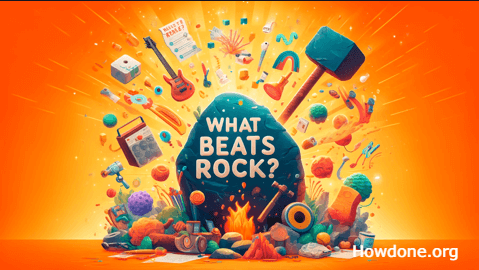Introduction
The age-old question, “What beats rock?”, is more than just a playful phrase from the classic game of rock, paper, scissors. Today, platforms like whatbeatsrock com have transformed this simple idea into a resource for exploring strategy, decision-making, and even psychology.
While on the surface it may seem like a lighthearted question, the concept actually teaches us valuable lessons about probability, human behavior, and competition.
This article will take you deep into the meaning, structure, and potential uses of whatbeatsrock com—from its origins in classic gameplay to its application in everyday life, strategy building, and beyond.
What is WhatBeatsRock com?

whatbeatsrock com is designed as a concept-based hub around the symbolic question “What beats rock?” Its foundation comes from the universal game rock, paper, scissors, where paper beats rock. But it doesn’t stop there. The platform and idea expand into strategic thinking, creative problem-solving, and decision-making models.
- Literal meaning: In rock, paper, scissors, paper beats rock.
- Figurative meaning: It symbolizes how even the strongest-seeming option can be countered by the right strategy.
- Practical applications: Used in conflict resolution, psychology, business strategy, and probability analysis.
The Origins: Rock, Paper, Scissors
To understand whatbeatsrock com, you first need to know the history of the game itself.
- Historical roots: Originated in China as “shoushiling” before spreading to Japan and later the rest of the world.
- Global popularity: Today, it is played universally as a decision-making tool or just a casual game.
- Symbolism: Rock represents strength, paper represents strategy, and scissors represent sharpness or adaptability.
Why Rock Is Important
Rock is often chosen more frequently by players because it symbolizes power and stability. Yet the counter-strategy, paper, represents subtle strength—reminding us that brute force is not always the winning approach.
The Core Idea of WhatBeatsRock com
The question “What beats rock?” seems simple, but it carries broader implications:
- Literal Game Logic: Paper beats rock.
- Philosophical Insight: Every strong force has a counterbalance.
- Strategic Application: Success comes from knowing when to use strength and when to use finesse.
WhatBeatsRock com as a Strategic Tool
The platform concept goes beyond gaming. It mirrors real-life decision-making.
Applications in Daily Life
- Conflict resolution: Instead of meeting force with force, use smart strategies.
- Business strategies: Outsmart competitors with innovation instead of brute resources.
- Personal growth: Reminds us that adaptability often beats rigidity.
Real-World Example
- A smaller startup beating a large corporation not through size but through innovation mirrors how paper beats rock.
The Psychology Behind WhatBeatsRock com
Psychologists have studied rock, paper, scissors as a tool to understand human choices.
- Predictability factor: People often unconsciously favor rock first.
- Behavioral cues: Strategic players anticipate opponents’ patterns.
- Lessons learned: Flexibility and unpredictability increase chances of success.
WhatBeatsRock com and Probability
From a mathematical perspective, the game works on chance, but strategy can shift the odds.
- Each choice has a 1/3 probability of winning, losing, or tying.
- Optimal play requires mixing unpredictability with pattern recognition.
- Extended versions: Variants like rock, paper, scissors, lizard, Spock expand the strategic complexity.
| Choice | Beats | Loses To |
| Rock | Scissors | Paper |
| Paper | Rock | Scissors |
| Scissors | Paper | Rock |
This simple cycle explains the eternal balance in decision-making.
Lessons We Can Learn from WhatBeatsRock com
The symbolic framework provides insights far beyond the game:
- Strength isn’t everything – strategy can outwit power.
- Every choice has a weakness – overconfidence often leads to defeat.
- Balance is key – adapt based on context, not habit.
- Decisions are cyclical – what works once may not work again.
Actionable Insights for Applying WhatBeatsRock com
- In Business: When competing with larger rivals, focus on creativity and niche positioning.
- In Education: Teach students about strategy, fairness, and critical thinking.
- In Relationships: Instead of overpowering arguments, use reasoning and perspective.
- In Gaming: Study opponent patterns, avoid predictability, and adjust tactics.
Expert Opinions on the Symbolism of Rock
Many thought leaders draw parallels between rock, paper, scissors and life:
- Business strategists see it as a metaphor for market competition.
- Educators use it to explain fairness, probability, and decision-making.
- Psychologists analyze it to study behavior and predictability.
Conclusion
At first glance, whatbeatsrock com may appear as a playful nod to a children’s game. But on closer inspection, it provides a powerful metaphor for life, strategy, and decision-making.
From business and psychology to conflict resolution and education, the lesson remains the same: every strong force has a counterbalance, and true success comes from adaptability and strategy.
Whether you approach it as a game, a teaching tool, or a philosophy for living, whatbeatsrock com offers insights that remain relevant in every aspect of modern life.
FAQs
Q1: What actually beats rock?
A: In the original game, paper beats rock because it symbolizes strategy overcoming strength.
Q2: Is whatbeatsrock com just about gaming?
A: No, it extends into lessons on psychology, decision-making, and even real-world strategies.
Q3: Can whatbeatsrock com be applied in business?
A: Yes, it mirrors how small innovative ideas (paper) can outperform large established companies (rock).
Q4: Why do most people choose rock first?
A: Rock is associated with strength and feels like a “default safe choice.”
Q5: Are there variations beyond rock, paper, scissors?
A: Yes, extended versions like rock, paper, scissors, lizard, Spock add more complexity.



